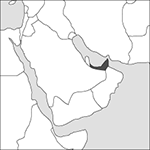
Source: MAPS IN MINUTES™ © RH Publications (1997)
Capital:
Abu Dhabi
Area:
83,600 sq km (32,278 sq miles)
Population:
5,473,972 (2013 est)
Currency:
1 UAE dirham = 100 fils
Religions:
Muslim 76.0%; Christian 9.0%
Ethnic Groups:
South Asian 50.0%; non-UAE Arab and Iranian 23.0%; UAE Arab 19.0%
Languages:
Arabic (official); Persian; English; Hindi; Urdu
International Organizations:
UN; GCC; Arab League; OAPEC; OPEC; WTO
A federation of seven sheikhdoms (emirates) occupying the southern (Arabian) coast of the Gulf between Qatar and Oman, together with its offshore islands.
Physical
Abu Dhabi in the west is the largest emirate and also the richest in oil and natural gas. Dubai to the east is the second largest emirate and has oil offshore, as has Sharjah. Further east, Ras al-Khaimah and Fujairah are predominantly agricultural, while Ajman and Umm al-Quwain are very small.
Economy
The economy of the UAE is based largely on crude oil, which, with natural gas, dominates exports. In addition, Dubai has a substantial entrepôt trade, as well as duty-free manufacturing zones, a highly developed property market, and is a tourist destination. Recent government efforts have diversified the economy, reducing the oil and gas GDP contribution to one-quarter. Apart from oil and gas, industries include petroleum products, fishing, aluminium (Dubai has the world’s largest aluminium smelter), cement, and fertilizers. Agricultural crops include dates, which are exported, vegetables, and watermelons. There is a large immigrant workforce, mainly of Pakistanis, Indians, and Iranians.
History
The sheikhdoms concluded several treaties with Britain from 1820 onwards. In 1892, they accepted British military protection, becoming known thereafter as the Trucial States. (The name derived from a maritime truce they made with Britain in 1836). The emirates came together as an independent state when they ended their individual special treaty relationships with the British government, and signed a Treaty of Friendship with Britain in 1971. The large oil resources of Abu Dhabi were first discovered in 1958. Each of the rulers of the seven constituent emirates has autonomy in his own state; the federal government deals with defence, foreign policy, and immigration. Sheikh Zayed bin Sultan al-Nahayan of Abu Dhabi was President of the Federation from 1979 until his death in 2004; he was succeeded by his son, Sheikh Khalifa bin Zayid al-Nurhayyan. In 2005 limited elections, based on a restricted franchise, were held. From 2008 the UAE, and particularly the booming Dubai property market, suffered from the Credit Crunch. Several pro-democracy activists were arrested in 2011 and 2012 following the Arab Spring, and to quieten potential opposition, major infrastructure investments took place in the poorer emirates. In 2014, the UAE joined Saudi Arabia in air attacks on the Islamic State in Syria and in the following year again joined Saudi Arabia in air strikes on Houthi rebels in Yemen.
- information island
- information leak
- information management system
- information paradox
- information processing
- information retrieval
- Information Revolution
- information satellite
- information science
- information sciences
- information society
- information source
- information storage and retrieval
- information structure
- Information Superhighway
- information superhighway
- information system
- information systems
- information technology
- information theory
- informative prior
- INFORMIX
- infospace
- infradian rhythm
- infragravity wave